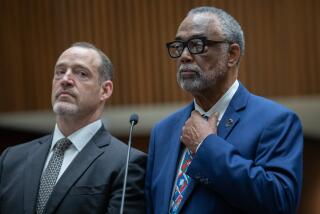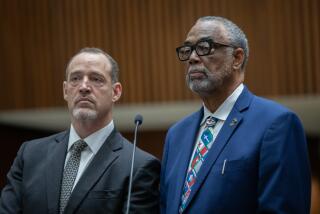Ex-Official Pleads Guilty to Lesser Charge, Is Fined
- Share via
LONG BEACH — Former Planning Commission Chairman Richard Gaylord, arrested after allegedly soliciting a sex act from an undercover police officer, pleaded no contest last week to a reduced charge of disturbing the peace.
Gaylord, a prominent real estate businessman, was fined $150 and sentenced to a year of unsupervised probation, which means that “he has to be a law-abiding citizen,” according to his attorney, Ed George.
For the record:
12:00 a.m. June 26, 1988 For the Record
Los Angeles Times Sunday June 26, 1988 Home Edition Long Beach Part 10 Page 3 Column 4 Zones Desk 1 inches; 33 words Type of Material: Correction
Richard Gaylord, former chairman of the Long Beach Planning Commission, pleaded no contest recently to a charge of disturbing the peace. A headline on a June 23 story in the Long Beach/Southeast sections incorrectly stated his plea.
Gaylord said he decided not to contest the new charge so he could put an end to the misdemeanor case, which began when he allegedly offered $20 to the male undercover officer on April 17 of last year.
“I feel the thing has gone long enough. It’s over,” Gaylord said this week. “We won in appellate court and in the Supreme Court and I think it’s time to put the thing to rest.”
Gaylord had pleaded not guilty to the original charge, arguing that the complaint filed by the city prosecutor was insufficient because it charged only that he and the officer had agreed to an act of prostitution. As of January, 1987, state law requires that “some act, beside the agreement” must take place before a solicitation charge can be made. The state Court of Appeal agreed with Gaylord last November, and the state Supreme Court let that ruling stand in April.
Then City Prosecutor John VanderLans filed a new complaint on the original charge and a trial was scheduled to begin Monday.
VanderLans has said that he pursued the case even after losing the appellate decisions because he believed it could set a precedent that would affect how police and his office deal with prostitution cases. The prosecutor said he had hoped the courts would specify what “some act” means.
“We were looking for some direction for what that means,” VanderLans said earlier this week. “The appellate court did not give us what we want: direction.”
But VanderLans said he does not expect changes in how cases are filed. Deputy Police Chief David Dusenbury also said he does not expect the Gaylord case to have an effect on police procedures.
More to Read
Sign up for Essential California
The most important California stories and recommendations in your inbox every morning.
You may occasionally receive promotional content from the Los Angeles Times.













